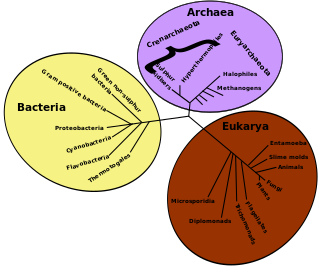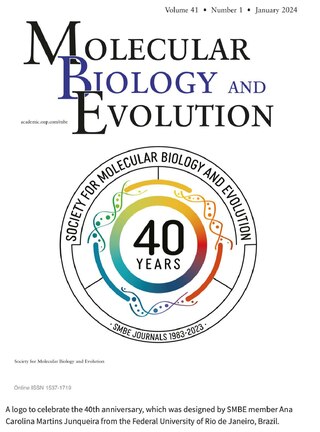
Theodosius Grigorievich Dobzhansky was an American geneticist and evolutionary biologist. He was a central figure in the field of evolutionary biology for his work in shaping the modern synthesis. Born in the Russian Empire, Dobzhansky emigrated to the United States in 1927, aged 27.

The modern synthesis was the early 20th-century synthesis of Charles Darwin's theory of evolution and Gregor Mendel's ideas on heredity into a joint mathematical framework. Julian Huxley coined the term in his 1942 book, Evolution: The Modern Synthesis. The synthesis combined the ideas of natural selection, Mendelian genetics, and population genetics. It also related the broad-scale macroevolution seen by palaeontologists to the small-scale microevolution of local populations.

Evolutionary biology is the subfield of biology that studies the evolutionary processes that produced the diversity of life on Earth. It is also defined as the study of the history of life forms on Earth. Evolution holds that all species are related and gradually change over generations. In a population, the genetic variations affect the phenotypes of an organism. These changes in the phenotypes will be an advantage to some organisms, which will then be passed on to their offspring. Some examples of evolution in species over many generations are the peppered moth and flightless birds. In the 1930s, the discipline of evolutionary biology emerged through what Julian Huxley called the modern synthesis of understanding, from previously unrelated fields of biological research, such as genetics and ecology, systematics, and paleontology.

George Christopher Williams was an American evolutionary biologist.

Evolutionary ecology lies at the intersection of ecology and evolutionary biology. It approaches the study of ecology in a way that explicitly considers the evolutionary histories of species and the interactions between them. Conversely, it can be seen as an approach to the study of evolution that incorporates an understanding of the interactions between the species under consideration. The main subfields of evolutionary ecology are life history evolution, sociobiology, the evolution of interspecific interactions and the evolution of biodiversity and of ecological communities.
In biology, gonochorism is a sexual system where there are two sexes and each individual organism is either male or female. The term gonochorism is usually applied in animal species, the vast majority of which are gonochoric.
The Society for the Study of Evolution is a professional organization of evolutionary biologists. It was formed in the United States in 1946 to promote the study of evolution and the integration of various fields of science concerned with evolution and to organize the publication of a scientific journal to report on relevant new research across a variety of fields.

Biology Letters is a peer-reviewed, biological, scientific journal published by the Royal Society. It focuses on the rapid publication of short high quality research articles, reviews and opinion pieces across the biological sciences. Biology Letters has an average turnaround time of twenty four days from submission to a first decision.

Evolution and Human Behavior is a bimonthly peer-reviewed academic journal covering research in which evolutionary perspectives are brought to bear on the study of human behavior, ranging from evolutionary psychology to evolutionary anthropology and cultural evolution. It is primarily a scientific journal, but articles from scholars in the humanities are also published. Papers reporting on theoretical and empirical work on other species may be included if their relevance to the human animal is apparent. The journal was established in 1980, and beginning with Volume 18 in 1997 has been published by Elsevier on behalf of the Human Behavior and Evolution Society. The editor-in-chief is Debra Lieberman.

Denis Noble is a British physiologist and biologist who held the Burdon Sanderson Chair of Cardiovascular Physiology at the University of Oxford from 1984 to 2004 and was appointed Professor Emeritus and co-Director of Computational Physiology. He is one of the pioneers of systems biology and developed the first viable mathematical model of the working heart in 1960. Noble established The Third Way of Evolution (TWE) project with James A. Shapiro which predicts that the entire framework of the modern synthesis will be replaced.

Molecular Biology and Evolution (MBE) is a monthly peer-reviewed scientific journal published by Oxford University Press on behalf of the Society for Molecular Biology and Evolution. It publishes work in the intersection of molecular biology and evolutionary biology. The founding editors were Walter Fitch and Masatoshi Nei; the present editors-in-chief are Brandon Gaut and Claudia Russo.

Cladistics is a bimonthly peer-reviewed scientific journal which has published research in cladistics since 1985. It is published by Wiley-Blackwell on behalf of the Willi Hennig Society. Cladistics publishes papers relevant to evolution, systematics, and integrative biology. Papers of both a conceptual or philosophical nature, discussions of methodology, empirical studies on taxonomic groups from animals to bacteria, and applications of systematics in disciplines such as genomics, paleontology and biomedical epidemiology are accepted. Five types of paper appear in the journal: reviews, regular papers, forum papers, letters to the editor, and book reviews. According to the Journal Citation Reports, the journal has a 2020 impact factor of 5.254, ranking it 10th out of 50 journals in the category "Evolutionary Biology". Its editor-in-chief is Rudolf Meier, who replaced Dennis Stevenson in 2019.
Anne Elizabeth Magurran is a British Professor of ecology at University of St Andrews in Scotland. She is the author of several books on measuring biological diversity, and the importance for quantifying biodiversity for conservation. She has won numerous awards and honors, is regularly consulted for global assessments and analyses of biodiversity and conservation and her research is often highlighted by journalists.
Laurent Keller is a Swiss evolutionary biologist, myrmecologist and author. He was a professor at the University of Lausanne from 1996 to 2023. In March 2023, the journal Science reported that sexual harassment allegations were leveled against Keller. According to the Science article, the University of Lausanne sent an email to staff in February of 2023 to inform them that Laurent Keller no longer works there.
Theodore Garland Jr. is a biologist specializing in evolutionary physiology at the University of California, Riverside.
Joseph Carroll is a scholar in the field of literature and evolution. He received his PhD in Comparative Literature from the University of California, Berkeley and is now Curators’ Distinguished Professor Emeritus at the University of Missouri–St. Louis.
Dominic D. P. Johnson is an Alistair Buchan Professor of International Relations at St Antony's College, Oxford.

Stephen C. Stearns is an American biologist, and the Edward P. Bass Professor of Ecology and Evolutionary Biology Emeritus at Yale University. He is known for his work in life history theory and evolutionary medicine.
Cognitive biology is an emerging science that regards natural cognition as a biological function. It is based on the theoretical assumption that every organism—whether a single cell or multicellular—is continually engaged in systematic acts of cognition coupled with intentional behaviors, i.e., a sensory-motor coupling. That is to say, if an organism can sense stimuli in its environment and respond accordingly, it is cognitive. Any explanation of how natural cognition may manifest in an organism is constrained by the biological conditions in which its genes survive from one generation to the next. And since by Darwinian theory the species of every organism is evolving from a common root, three further elements of cognitive biology are required: (i) the study of cognition in one species of organism is useful, through contrast and comparison, to the study of another species' cognitive abilities; (ii) it is useful to proceed from organisms with simpler to those with more complex cognitive systems, and (iii) the greater the number and variety of species studied in this regard, the more we understand the nature of cognition.

Amitabh Joshi is an Indian evolutionary biologist, population ecologist, geneticist and a professor at Jawaharlal Nehru Centre for Advanced Scientific Research (JNCASR). He heads the Evolutionary Biology Laboratory at JNCASR and is known for his studies on Evolutionary genetics and Population ecology. An elected fellow of the Indian Academy of Sciences, National Academy of Sciences, India, and Indian National Science Academy, he was also a J. C. Bose National Fellow (2011-2021) of the Department of Science and Technology. He served as the Chief Editor of the Journal of Genetics (2008-2014) and Editor of Publications of the Indian Academy of Sciences (2017-2021). The Council of Scientific and Industrial Research, the apex agency of the Government of India for scientific research, awarded him the Shanti Swarup Bhatnagar Prize for Science and Technology, one of the highest Indian science awards, in 2009, for his contributions to biological sciences.












